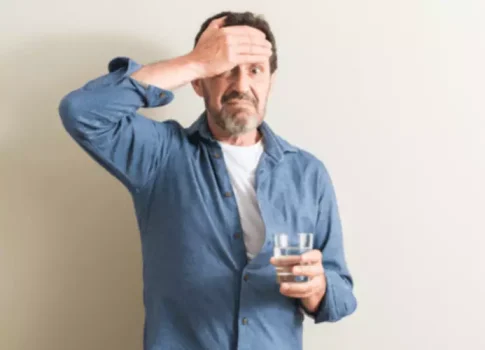
However, these benefits should not be mistaken for hydration effects. No, the myth that beer hydrates you after exercise or in hot weather is false. Alcohol can actually increase the risk of dehydration in these situations, as it interferes with the body’s ability to rehydrate effectively. But the type of alcohol you choose affects how dehydrated you become. “The darker the beverage or higher the alcohol by volume (ABV) concentration, the more dehydrating it can be,” says New York City-based addiction specialist Aaron Sternlicht, LMHC, CASAC. Alcohol dehydration cures abound, but before you trust old wives’ tales or the hair of the dog, read on.

Raise a Glass—Or Maybe Don’t: The Sobering Secret About Alcohol and Cancer

For those who find alcohol is taking over their life outside the party scene, we are here to help. Our unique three-phase approach to addiction treatment is the only one of its kind. We can adjust the treatment path to fit the various needs of our clients. In our blogs, we provide education and resources to our Suncoast communities. Try to recognize these early signs and seek medical attention to prevent further liver damage, as untreated alcohol-related liver issues can become irreversible. Did you know that too much alcohol prevents proper nutrient absorption and metabolism, preventing them from reaching your cells?
Choose Drinks with Lower Alcohol Content
Each of these can be a contributor to alcohol-related headaches, but dehydration is a close threat when partaking in any alcoholic beverage. Use these social-bookmarking links to share Why does drinking alcohol cause dehydration?. It reduces how much ADH you make, so it increases how much urine you produce. Each shot of alcohol that you drink forces your kidneys to generate an extra 120 millilitres of urine on top of the normal 60–80 millilitres per hour.
Alcohol Dehydration Symptoms
Because alcohol is a potent diuretic, it can quickly dehydrate you, leading to the characteristic symptoms of a hangover, including a throbbing headache. Research reviews have also listed alcohol as a culprit for triggering migraine attacks. Additionally, heavy drinkers usually get most of their calories from alcohol. The problem is that alcohol is a wellspring of empty calories—which are calories with minimal nutritional value.
- A 2016 study published in the American Journal of Clinical Nutrition assigned a beverage hydration index (BHI) to various drinks that would determine hydration status after ingestion.
- Instead, doctors propose the theory may be more of a mental suggestion to a person when drinking.
- Several studies have found that increased alcohol intake doesn’t correlate with decreased vasopressin levels 1011—so is alcohol really suppressing vasopressin?
- But if you’re in danger of a hangover or are already in the throes of this unpleasant but common alcohol aftereffect, you can try treatments like Next Health’s IV Drip Therapy.
But even today we still don’t fully understand how alcohol causes this excessive urination. We humans have been making and drinking alcohol for thousands of years. Yes, rehydration is one of the best ways to reduce hangover symptoms.

The answer is no, there is no way to just “get rid” of a hangover. The body is in recovery mode after a night of heavy drinking, and the only way it will feel better is with time. Some other methods of helping a hangover include hydrating, light exercise, rest, eating a healthy meal, and taking an over-the-counter pain medication. It is important to note that medications can cause side effects that make the hangover worse, and possibly dangerous.
- Alcohol has a dehydrating effect on the body, especially when a person consumes it in large quantities.
- This test is for informational purposes only and is not a substitution for a diagnosis by a trained medical professional.
- This is because the carbonation can cause gas to build up in your stomach, leading to discomfort and bloating.
- Of course, the more you urinate, the faster you’ll become dehydrated if you keep following up with more glasses of wine.
However, most research suggests people’s bodies still respond differently to alcohol. why does beer make you dehydrated Some people may find they pee more when they drink it, while others pee less. First, your kidneys regulate the amount of water in your body. They do this by monitoring the plasma osmolality of your blood. It impairs your kidneys’ ability to filter blood and makes them work harder.
A great way to prevent dehydration from alcohol is to make mineral supplements a part of your daily routine. You’ll be much less likely to experience dehydration if your body is already well-stocked with the nutrients it needs to fight back. Drinking after a nutrient-dense meal of healthy carbohydrates, protein, fiber, and fats provides more of a “slow release” effect. Because the antidiuretic effects kick in more slowly, you are less likely to experience dehydration. Since the alcohol content reaches your bloodstream faster, you might find yourself bringing up politics with Aunt Janet just two drinks in.
Does Alcohol Make You Pee More?
Follow drinking behaviors that are best for you, not what everyone else is doing. And above all, limiting your alcohol consumption in general is the best way to avoid dehydration. “If you’re thirsty, your body will tell you to drink more,” Maughan said. Drinking alcohol inhibits the body’s release of the hormone vasopressin. Alcohol dehydrates you because it causes the body to urinate more frequently.
Why Does Alcohol Make You Pee So Much?
We’ve had a night out, and the next morning we wake up and aren’t feeling well. If you don’t feel better from drinking plain water, try adding an electrolyte mix to water or drinking a low-sugar drug addiction treatment sports drink that contains electrolytes. One glass of liquor drunk slowly over the course of an evening will be less dehydrating than having several beers or glasses of wine during the same time frame. That said, the higher a drink’s alcohol content, the more of a diuretic it’s believed to be.